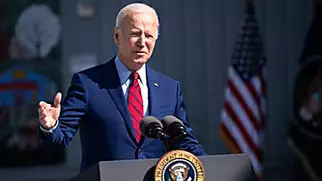TRENDING:
begin quote from:
Debt ceiling fight pits corporate America against Republicans
The debt ceiling battle on Capitol Hill is pitting corporate America against congressional Republicans in a test for business groups that have historically aligned with GOP lawmakers on economic issues.
Senate Republican leaders are digging in on their opposition to raising or suspending the debt limit, prompting sharp warnings from lobbying groups that represent some of the biggest U.S. corporations.
The stakes are high in the standoff between Democrats and Republicans. Defaulting on the debt — or even coming dangerously close to doing so — could undermine the nation’s credit rating and upend the global financial system, posing a major risk to company stock prices and corporate bonds.
“The United States of America defaulting on its obligations is not an option; we are counting on Congress to take the necessary steps to address the debt limit,” said Neil Bradley, executive vice president and chief policy officer at the U.S. Chamber of Commerce, the nation’s largest corporate lobbying group.
House Democrats on Tuesday unveiled a bill to suspend the debt limit until after the 2022 midterm elections. While the measure is expected to pass the House, Senate Minority Leader Mitch McConnell (R-Ky.) is privately whipping his caucus to vote down the measure when it comes to the upper chamber.
Republicans want Democrats to “own” the debt ceiling hike by including it in their $3.5 trillion reconciliation bill, which can pass the 50-50 Senate with a simple majority. But Democrats are insisting on a bipartisan vote to raise the limit, noting that it won’t be included in their reconciliation package, which may not be ready by the time the U.S. nears a default sometime in October. A bipartisan measure would require 60 votes to pass the Senate.
The risky strategy pits Republicans against corporate America, whose leaders are urging Congress to raise or suspend the debt limit as soon as possible given the likely financial turmoil that would ensue.
A coalition of groups representing investment firms and banks, including Morgan Stanley and Bank of America, warned congressional leaders in a letter last week that a default would damage the nation’s credit, make it harder to pay down debt and pummel financial markets that rely on U.S. Treasury bonds.
“Defaulting on our existing obligations would be irresponsible and do irreparable harm to the U.S. economy and taxpayers,” the groups wrote.
The Business Roundtable, which represents the CEOs of some of the nation’s largest companies, separately sounded the alarm that a default would saddle the federal government and private companies with significantly higher borrowing costs.
“Failure to lift the U.S. federal debt limit to meet U.S. obligations would produce an otherwise avoidable crisis and pose unacceptable risk to the nation’s economic growth, job creation and financial markets,” Business Roundtable CEO Joshua Bolten and Walmart CEO Doug McMillon wrote in a letter to congressional leaders.
Republican opposition to raising the debt limit underscores the divide between GOP lawmakers and corporate America that has only grown in recent years. Company executives can still count on Republicans to deliver tax cuts, but their influence has waned on other hot-button issues like climate change, voting rights and immigration.
No House Republicans voted for the John Lewis Voting Rights Advancement Act after more than 150 large corporations employing 4 million U.S. workers urged them to support the bill. Corporate America also failed to generate GOP support for the Equality Act, a bill that would codify discrimination protections for LGBTQ individuals, and measures to provide a pathway to citizenship for undocumented immigrants.
“The Republican Party has become a populist party, thanks largely to Donald Trump but also because of the presence of what’s now the Republican base. And for that very reason, corporate America has much less influence than it used to have,” said Geoff Kabaservice, director of political studies at the Niskanen Center, a right-leaning think tank.
“I think they’re right to be nervous,” he added, referring to major corporations worried about the potential of a default.
While many Republicans, including McConnell, have said that nobody wants the U.S. to default on its debt, GOP lawmakers have also expressed confidence that Democrats will take the blame if it happens since they control Congress and the White House.
“If the Democrats don’t do their job, I guess it will be political blowback for them,” Sen. Rick Scott (R-Fla.), head of Senate Republicans’ campaign arm, said last week.
Business groups haven’t called out Republicans in the debt limit battle, instead urging both sides to come to an agreement. Corporations are wary of angering congressional Republicans, who have vowed to take revenge on companies that denounced state-level GOP voting laws and Republican attempts to overturn the 2020 election.
Even the Chamber of Commerce, which spends millions of dollars on ads backing Republicans’ reelection campaigns, drew backlash from GOP lawmakers like Sen. Tom Cotton (Ark.) after it endorsed several House Democrats in the 2020 election.
“Corporate America talked a big game about not donating to the campaigns of Republican politicians who voted to overturn the Electoral College result, and yet most of them in the end came around because they believe Republicans will be in the majority after the 2022 elections,” Kabaservice said. “On some level they think Republicans will still support their interests, whether it be tax cuts or deregulation.”
The U.S. came close to defaulting on its debt in 2011, when congressional Republicans refused to raise the debt ceiling unless Democrats agreed to cut spending. The spat prompted one firm to downgrade the nation’s credit rating.
By raising or suspending the debt limit, Congress allows the U.S. to sell more Treasury bonds to pay for spending that has already been authorized. Raising the limit alone does not authorize new spending, and the most recent congressional agreement to suspend the debt ceiling took place during the Trump administration.
In addition to disrupting global markets, a default would pause federal payments through programs like Social Security and Medicare and freeze military salaries. Experts say a default would increase borrowing costs for credit cards, mortgages and car loans.
A federal default would also hammer state and local governments, particularly those that are anticipating federal funds to combat the damage done by Hurricane Ida.
“No city in America would risk their credit by treating a potential default as an opportunity for partisan gamesmanship,” National League of Cities CEO Clarence Anthony said in a statement Monday. “Congressional leaders and the administration must come together to prevent a default on the nation’s debt.”
Treasury Secretary Janet Yellen wrote in a Wall Street Journal op-ed on Sunday that a default on U.S. debt would “permanently” weaken the nation.
“The U.S. has never defaulted. Not once. Doing so would likely precipitate a historic financial crisis that would compound the damage of the continuing public health emergency,” Yellen wrote.





No comments:
Post a Comment